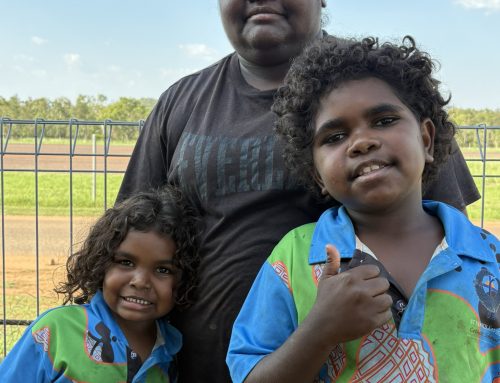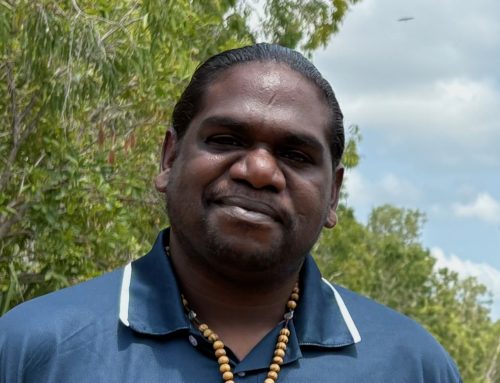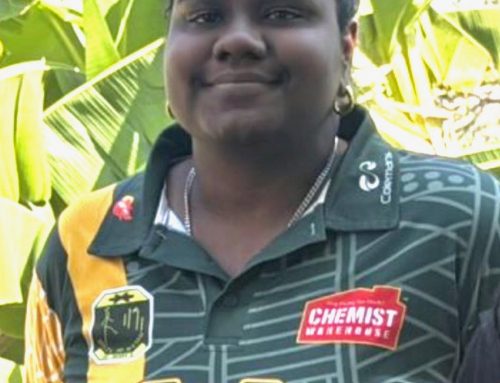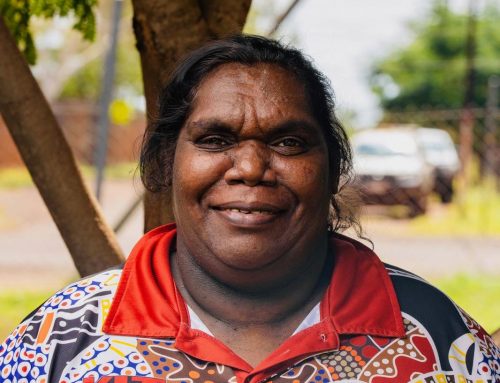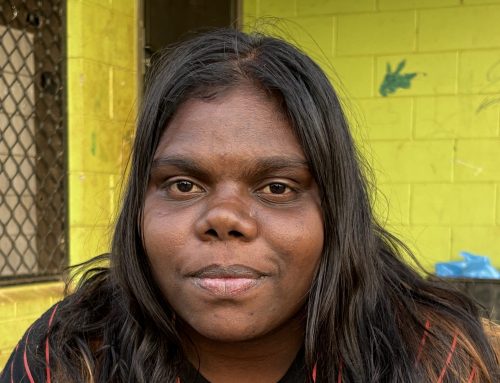Darwin and Gapuwiyak, NT
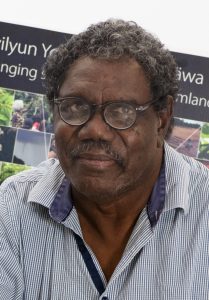 Gawura Waṉambi
Gawura Waṉambi
Researcher and Senior Lecturer in Aboriginal Studies
Gawura works closely with Northern Institute researchers as well as Yolŋu teachers providing guidance, cultural authority and education.
Ŋarra yäku Gawura Waṉambi. Wäŋany ŋarraku Raymaŋgirr. Bäpurruny Ŋarra Marraŋu. Bundurrnydja ŋarra Gatjinydji, Ḏalthaŋu, Muwuḻu, Binygurrŋu, Dhaliyali. Ga ŋutharnydja ŋarra marrtjin ŋunha retjaŋur yan. Marŋgithin ŋarra marrtjin retjapuywu yan ŋathaw, nhinanharaw ga ŋorranharaw retjaw yan, märranharaw ŋathaw, wäyingu gapupuywu ga ḏiltjipuywu. Nhäŋal ŋarra marrtjin rom nhaltjarr gan ŋaḻapaḻmirr waŋanamin, ŋamaŋamayunmin, nhäŋal nhä gan burwu barr’yurr nhaku ŋathaw märranhaw, nhä warrakan gan djukurr’mirriyin, nhä maranydjalk wo guya wo minaŋara. Nhälil wäŋalil dhu ŋurukiyiw ŋathaw marrtji, nhäthamirriy waluy ŋayi ŋuli ŋunhi borumdhirr wo djukurr’mirriyirr. Balanyaraw ŋarra marrtjin marŋgithin.
My name is Gawura Waṉambi. My home is Raymaŋgirr. My clan-nation is Marraŋu. My bundurr1 is Gatjinydji, Ḏalthaŋu, Muwuḻu, Binygurrŋu and Dhaliyali. I grew up in the bush and learned about the bush food and how to collect them and learned to live the bush. I was learning rom2 by watching elders discussing, making decisions. I was learning which flowers bloom for which food to collect and when animals became fatty such as stingrays, fish and rock oysters, also learning where is the place to collect those food. I was learning by watching how rom was performing, the songline tells and teaches us through which country it travels and where it begins and where it finishes or completes. It tells and teaches us the path of the songlines that can be though under the water and through the bush where the songlines are embedded.
Nhäŋal ŋarra marrtjin nhaltjarr gan ŋamaŋamayurr rom malanynha, dhuwurrwu manikay wanhagurr dhu ga guyurr marrtji, wanhami dhu ŋurr-yirr’yun ga wanhami dhu dhädhawar’yun wo ŋurrkam. Ŋoygurr gapugurr ga ḏiltjigurr ga wanhal wäŋaŋur ŋunhi manikay. Nhaltjan dhu gakal’ buŋgul djäma yuwalkkurr yan gatjaḻkurr ŋäthiliŋuwurr. Nhäŋal ŋarra marrtjin rom ŋunhi nhaltjarr walal gan ŋaḻapaḻmirr dhuwurrgurr mägayagurr dhäruk waŋan, yaka yätj matha ga dhuwurr mayali’miriw. Dhäruk malanya ŋunhi yaka ŋayaŋu wuthunmirr. Malthu’malthurruna ŋarra marrtjin wiripuw malaŋuw ŋaḻapaḻmirriw manikaygurr romgurr, bäpurrugurr, maḏaḏagurr, waŋdjurrgurr, marradjiri wo mamurruŋgurr. Ŋaḻapaḻmirriy gan mägaya rom yan ŋamaŋamayurr, ŋarrany marrtjin malthurruna walalaŋ ga marŋgithinan manapar ŋurukiyi dhukarrwu. Buluny ŋarrany walal nhakun märraŋalnha bala djuḏupmaraŋalnha balan ḏumurruŋulilnha romlil Ŋärralilnha. Bala ŋarra bitjarra nhakun walalnha ŋunhiyin mala ŋaḻapaḻmirrnha. Rrambaŋin ŋanapurr marrtjin ŋamaŋamayurr wo bokmar nhä rom malanynha. Ŋarrakuwuy Marraŋu rom wo wiripuw dhuwaw bäpurruw ga wiripuny ŋarraku ŋäṉḏi ga märi rom ŋarra ŋuli ga djäga ga ŋamaŋamayun.
I was learning by watching how I should perform the ceremony only in a truthful way that accords with the path of Yolŋu rom. I was learning by watching how the elders were talking languages in a peaceful manner, not with evil tongues nor senseless cultural practice with using words that don’t touch people’s heart, and are not worthwhile to give or take. I was also following other clan groups elders in funeral, cleansing ceremony with using leaves, cleansing ceremony with water, ceremonial pole ritual, and gift-sharing ceremony. Only the elders established peace through the rom, I was following them and learning the path together. Then they selected me and put me into the deep knowledge of Ŋärra3. I performed like them, the elders. We were performing and bringing our rom. My own Marraŋu culture and different Dhuwa4 clan-nations. I am also looking after and performing my mother’s and mother’s mother’s rom.
Dhiyaŋuny bala ŋarra dhuwal nhakun dharaŋanawuynha yolŋu ŋarrakalaŋuwuŋ malaŋuwuŋ miṯtjiwuŋ ga bäpurruwuŋu, ŋunha biḻmagurr rom ga gali’wurr (Maḏayingurr) romgurr. Djirrikay’mirr ŋarra. Gunburyun ŋarra dhu ŋarranhapinya ḻikan wo wiripuny dhuwany bäpurruny ḻikan. Ŋarambiya-dhuḻaŋmirr ŋarra ga goŋ-nyanyuk ŋarra. Nhä ŋarra dhu ŋamaŋamayun ŋarrakalaŋuw bäpurruw ga ŋarrakalaŋur ŋäṉḏipuluw. Gakal ŋarra ga ŋayatham ŋarrakalaŋuw miṯtjiw, ŋäṉḏipuluw, momupuluw, wakupuluw, märipuluw ga yapapuluw. Ŋunhiyi bili ŋarraku dhiyaŋuny bala gakal, mägayaŋur gatjaḻŋur ŋarra ga dharra. Rom, ḻiya, dhuwurr, dhäruk, djuŋuny ga buyu nininyŋu ḏitjpu yolŋu yan Marraŋu. Bäyŋu ŋarrany dhu nhäthu wo yolthu bilmaram dhipuŋur.
Now I am knowledgeable person. I know the people from my clan-nation, through the rom of the clapstick and sacred knowledge (through Maḏayin5). I am a Dhuwa ceremonial leader. I chant the sacred names of my clan estate and other Dhuwa clan-nations. I have an authority of painting the clan design of the sacred knowledge with my skillful hands. I perform the knowledge of my clan-nation and my mother’s clan-nation. I have skill-sets (knowledge, performance, leadership) for my, my mother’s, mother’s father, mother’s mother’s mothers’ clan-nation, also mother’s mother’s clan-nation and mother’s mother’s mother’s mother’s clan-nation. That is the skill and knowledge I am having now. I am living with a peaceful path of rom – education, knowledge, law, language, identity and sacred strings… I am a Marraŋu person forever. No one can change me from here where I am and from now when I am.
1 Refer to ‘Bundurrpuy: What does bundurr mean?’
2 Rom has multiple meanings as law, education, culture, custom, tradition, and behaviour.
3 A closed and important ceremony associated with Ancestral creators and beings.
4 One of the moiety. The opposite to Dhuwa is Yirritja.
5 Sacred business and ceremony
Media Stories:
- Caring for Yolŋu and ways of life during COVID 19 (Indigenous X, June 2020)
Presentations:
“From Cyclones to COVID-19: Disaster Management from a Yolŋu perspective”


